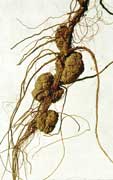 Agrobacterium is a well-known genus in bacteriology and molecular biology, but research has shown that it cannot easily be separated from the Rhizobium genus, thus all Agrobacterium species should be renamed as Rhizobium species (the earlier name). However there has been some opposition to renaming Agrobacterium, in this article I explain the research and taxonomy, and suggest a solution.
Agrobacterium is a well-known genus in bacteriology and molecular biology, but research has shown that it cannot easily be separated from the Rhizobium genus, thus all Agrobacterium species should be renamed as Rhizobium species (the earlier name). However there has been some opposition to renaming Agrobacterium, in this article I explain the research and taxonomy, and suggest a solution.
 GenBank from the NCBI is an amazing and invaluable resource for DNA sequences, and combined with the searching tool BLAST it is really easy to identify your unknown gene sequence.
GenBank from the NCBI is an amazing and invaluable resource for DNA sequences, and combined with the searching tool BLAST it is really easy to identify your unknown gene sequence.